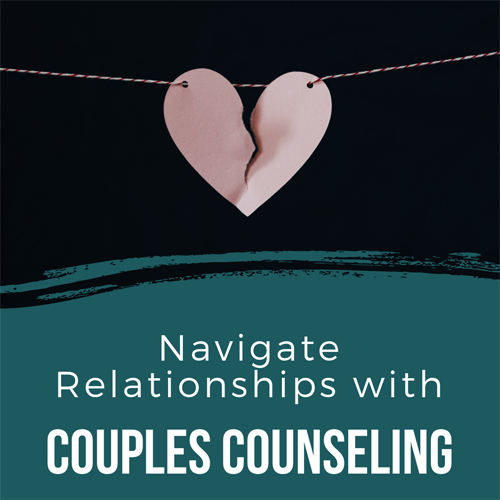Couples Counseling
Have you and your partner become more like roommates? Or does asking for help with the laundry lead to a huge fight? Is it no longer possible to talk without one of you feeling attacked and getting defensive? Do you feel lonely in your own home?
Whatever your struggles are, I can help by combining the dynamic assessments I use to discover how your past might be contributing to your story with the power of researched interventions proven to stop the fighting and increase connection.
A Research-Based Approach to Couples Counseling
I am trained in The Gottman Method, one of the most popular approaches to couples counseling used by couples therapists today. What makes it so unique is that it is entirely based on research findings, so we know the interventions work.
John Gottman, Ph.D. has spent more than 40 years studying couples. The result of this research? His findings are able to predict (with over 90% accuracy) which couples will end up happy, unhappy, or divorced. He has developed an assessment tool, The Gottman Relationship Checkup, that extends that research to your specific relationship.

In short, The Gottman Relationship Checkup tells us what is working in your relationship and what isn’t. The assessment tool is thorough and uncovers areas of struggle that you may not be aware of, while also highlighting the strengths you may be taking for granted.
The tools and skills we’ll review aren’t hard to learn. Research has proven that they’ll improve connection and decrease fighting. All you have to do is commit to practicing using the skills in your relationship.

On Couples Counseling

Couples Counseling FAQs
What can we expect in couples counseling?
I use a 5-phase treatment model to help couples meet their goals and see results:
- Initial Couples Session – In this 75-minute session, both partners get the opportunity to share their perspective and their goals.
- Individual Sessions – Next, each partner has 1-2 individual sessions without their partner present. This gives that person the opportunity and safety to discuss their concerns, hopes, and goals, while also reviewing their own history. This is the only session you’ll attend without your partner present.
- Gottman Relationship Checkup – This online assessment tool consists of 480 questions about friendship, intimacy, how well you know your partner, how you manage emotions and conflict, how you share your values and goals, and what gives meaning to your lives. There are additional questions about parenting, housework, finances, trust, and individual areas of concern.
- Treatment Plan – After reviewing over 1,000 points of data from the assessment and our individual session, I will write up a Treatment Plan so you can see how we will ensure you achieve your goals.
- Implementation – Ongoing sessions will always include both partners and focus on learning new relationship skills, processing any fights, and reviewing your progress.
My partner won’t come to couples counseling with me. Can I make progress if I come alone?
While it’s ideal to have both partners attend couples counseling for relationship problems, progress can be made in your relationship even if only one of you attends counseling. This is because the individual coming to counseling will be adding new ideas, learning more about how to better communicate, discovering what they want out of their relationship, etc…. If the person coming to counseling starts behaving differently based on their individual work, the other partner will have to respond differently.
Does couples counseling work?
If both partners are willing to try, couples counseling can be very effective.
How long until we see results?
The job of the therapist is to help you learn things—whether it’s tools or insight, etc., but the work you do outside of therapy is up to you. The more you try new things outside of our sessions, the faster you’ll see lasting change.
Do you take insurance?
I am an out-of-network provider. If you have out of network mental health benefits, you can submit your receipts to your insurance to get a portion of the cost reimbursed. Please note that many insurance companies do not cover couples counseling. You can read more about my fees and my reasoning for not taking insurance here.
How often do we need to come?
Couples are encouraged to come weekly in the first 6 weeks, as this allows you to start feeling relief fast, helps you implement change quickly, and holds you accountable. This all adds up to you getting more bang for your buck as you’ll be condensing the work and therefore saving time, money, and energy in the long-run. When clients are unable to come weekly, it often increases the amount of ‘catch up’ time we do during sessions, which can be a distraction from the real work of improving your relationship. After the first 6-8 weeks, you can start spacing out sessions.
Can I start therapy with you as an individual and then add my partner later on?
No. As a Licensed Professional Counselor, it is against my Code of Ethics to see you as an individual and then add your partner in at a later date for couples counseling. This is because it would be impossible for me to remain impartial and unbiased, and ultimately would not be best for your relationship as a whole.
One exception to this is if a client begins therapy with me as an individual client and wants to bring their partner to a session or two, that is possible as long as the goal of these sessions is to support the individual client.
What fees are involved with couples counseling?
Couples counseling fees are:
- Intake/1st session – 75 minutes: $185
- 50-minute session: $150
- 75-minute Couples session: $185
- 90-minute Individual session: $225
- Gottman Relationship Checkup for couples: $29 paid directly to the Gottman Institute
